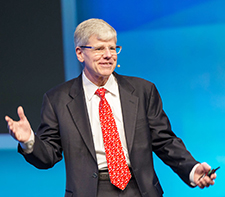
Steven L. Shafer, M.D.: ‘Computers can produce something that resembles human intelligence. But they can never replace us because they have no hands. Our combination of cognitive and physical skills is difficult to automate.’
Clinical decision support from a cognitive computing system called Watson is already a reality in oncology practice. Watson, or one of its successors, will almost certainly be providing anesthesiology recommendations in the very near future.
“Just like the blood gas machine did a generation ago, cognitive computing will change the practice of anesthesiology and medicine,” said Steven L. Shafer, M.D., Professor of Anesthesiology, Perioperative and Pain Medicine at Stanford University and Editor-in-Chief of Anesthesia & Analgesia.
“Decision support, provided by Watson or a similar system, will become the standard of care in oncology,” he said. “The reason is that patients come first, and cognitive computing never, ever, forgets that basic premise. If decision support can provide better outcomes, and the early signs are that it does, it is the way we will go.”
Dr. Shafer explored the coming sea change that cognitive computing will bring to health care during Tuesday’s John W. Severinghaus Lecture on Translational Science, “Disruptive Technology in Anesthesiology.” Cognitive computing won’t just change health care, it will disrupt and redefine all of the ways health care is conceived and delivered.
“Anesthesiology was founded by the most disruptive technology imaginable, rendering the brain reversibly insensible,” he said. “In the decades after ether, we continuously introduced disruptive technologies. For anesthesiologists, disruption is an opportunity, not a threat. We must be the inventors who combine clinical acumen and experience with advances in science and technology, and introduce them into perioperative care.”
The human brain excels at skills such as pattern recognition that allow us to perceive objects, rewards and threats in the blink of an eye. Computers excel at computation. But as computing power increases, the same brute force methods that enabled Big Blue to defeat reigning chess champion Garry Kasparov in 1997 have been transformed into computer learning.
In 2011, Watson pummeled the two most successful “Jeopardy” players, Ken Jennings and Brad Rutter. Three years later, IBM and Memorial Sloan Kettering Cancer Center created Watson Oncology, an oncology decision support system capable of synthesizing and distilling the entire oncology database into individualized diagnostic and treatment recommendations.
“Cancer is a genomic disease,” Dr. Shafer said. “Modern treatment involves sequencing the tumor and sequencing the patient to identify the handful of genomic and genetic variations that matter out of the background noise of inconsequential variations, and then identify the most relevant treatment regimen for that particular patient. This is the kind of decision support that we can use.”
Dr. Shafer likened clinical decision support to the Google decision support that guides him on the drive from his home in San Francisco to his office at Stanford. Google analyzes and synthesizes far more sources of information than a single person could juggle to determine the most efficient driving route at any particular time and adjusts those recommendations in real time as driving conditions change.
“We can optimize care at the individual level just as Google can guide me on my drive to the office,” Dr. Shafer said. “Computers can produce something that resembles human intelligence. But they can never replace us because they have no hands. Our combination of cognitive and physical skills is difficult to automate. As the creators and purveyors of this next generation of disruptive technology, we will continue to advance patient care while maintaining the vitality of our profession.”
